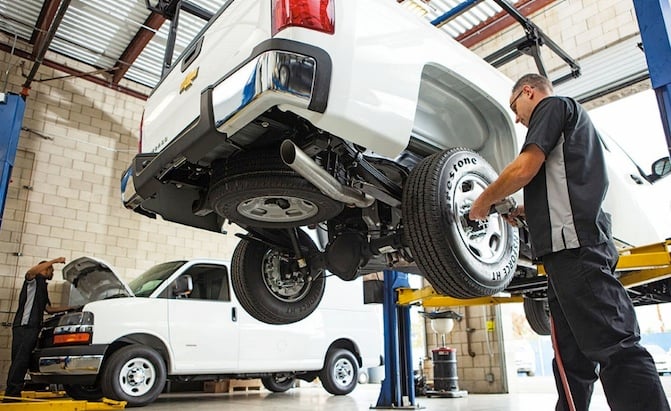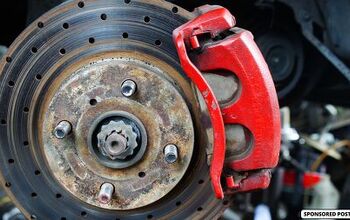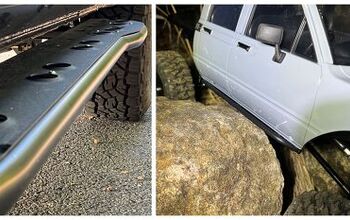Do You Have To Get Warranty Work Done At The Dealer?
There’s no question that warranty coverage is one of the main reasons many people buy a brand new car rather than test their luck on the secondhand market. Knowing that you’ll have peace of mind for the first several years of ownership, at the very least – and in some cases, as long as a decade – makes it worth paying that new car premium.
Lost in the shuffle, however, is the fact that warranty repair work is a major profit center for car dealerships, which are reimbursed by the corporate mothership for every oil change, tire rotation, and parts replacement they perform. The cash flow that this type of work represents has created one of the most pervasive myths surrounding owning a new vehicle: that all of your warranty work absolutely, positively, has to be done by the dealer.
It doesn’t.
Scare Tactics
That doesn’t mean you won’t come across many, many arguments attempting to convince you otherwise. Perhaps the most common is the threat that, should an owner attempt to have their in-warranty car or truck serviced by someone other than the dealer – or in some cases, even at a different dealer than the one who sold them the vehicle – the entire warranty will be rendered void immediately. You’ll hear this repeated by friends, family members, and quite often less-scrupulous service managers attempting to keep your business where they think it belongs.
Then there’s the common claim that modern cars are ‘too complex’ for independent repair shops to work on properly, and that only dealers have the equipment and expertise required to work on the newest, and most advanced models.
Legal Opinions
The latter feels persuasive at first. Wouldn’t it make sense that a dealership would have the most up-to-date gear and training for each model it sells? – and in some past cases (primarily with European automakers who did their best to withhold diagnostic tools from non-factory shops) it has carried the whiff of truth. However, a series of lawsuits concerning the right-to-repair, plus the gradual democratization of technology for independent mechanics, has leveled the playing field in terms of skill and tooling.
The long arm of the law has also intervened when it comes to the other scare tactic listed above, because it was used so often, and had such a chilling effect on owners. In fact, the United States has legislation, called the Magnuson-Moss Warranty Act, that deals specifically with in-warranty repairs. In effect since 1975, Magnuson-Moss was intended to clarify the details of any guarantee associated with a consumer product, as well as offer individuals the freedom to have repair work effectuated by any shop or professional of their choosing, rather than relying exclusively on the manufacturer.
Magnusson-Moss is a powerful tool, for several reasons. In addition to allowing you to go to a more convenient quick lube shop for an oil change, it also frees you from having to buy specific parts, fluids, or other components from the dealership or manufacturer if you do not want to do so, without impacting your warranty status. In fact, if your vehicle requires a very specific part or a unique formulation of oil, and you can’t find an aftermarket or third-party equivalent, the makers of your vehicle must provide you with it for free so you can have it installed elsewhere.
In Canada, the law is a little different. You don’t have to go to the dealer, natch, but you may be required to purchase OEM-specific fluids – such as transmission or engine oils – if they are absolutely required for the repair work that needs to done.
Cross Those T’s
The freedom to do what you want when it comes to your new vehicle warranty repairs comes with a very important caveat. Regardless of what work you have done, you need to keep meticulous records of who did it, where, and with what parts/fluids/belts/rubber, because car companies will always want to verify that the procedures outlined in their own repair manuals were followed as closely as possible.
It makes sense. An OEM isn’t going to be willing to honor the warranty on your vehicle if you chose to fill the engine with a lubricant that wasn’t appropriate for its design specs, for example. Likewise, you’ll also see push-back if a third-party shop damages a replacement part, or another part of the vehicle while installing it. Keep track of everything that’s done outside the dealership, with receipts, so you can defend your warranty rights if required.
Your Car Belongs To You
Many of you are probably asking yourselves why anyone would ever want to go anywhere else for service and risk having to argue with the dealership about warranty claims. There are a few compelling scenarios why some owners would choose to avoid a dealer service bay.
Some people live far from the spot where they purchased their car, and it’s simply more convenient to get minor servicing done locally rather than drive an hour or two for an appointment. Others are tired of having ‘extras’ like engine flushes and other preventative maintenance pushed on them when simply trying to get their tires rotated. Finally, there is a small contingent of owners out there who enjoy the simple pleasures of working on their cars themselves.
The bottom line? Your car belongs to you. You make the payments every month, and you should get to decide when and where you want to have it worked on, without risking your warranty.
And fortunately, the law is on your side.
More by Benjamin Hunting


































Comments
Join the conversation
Very misleading article- No mention of the process to get reimbursed from the manufacturer for warranty repairs performed by Independent Repair Facility. I doubt that an IRF would have any interest in submitting a warranty claim to the manufacturer and it is difficult and time consuming to get reimbursed for non emergency warrantable repairs performed by an IRF.